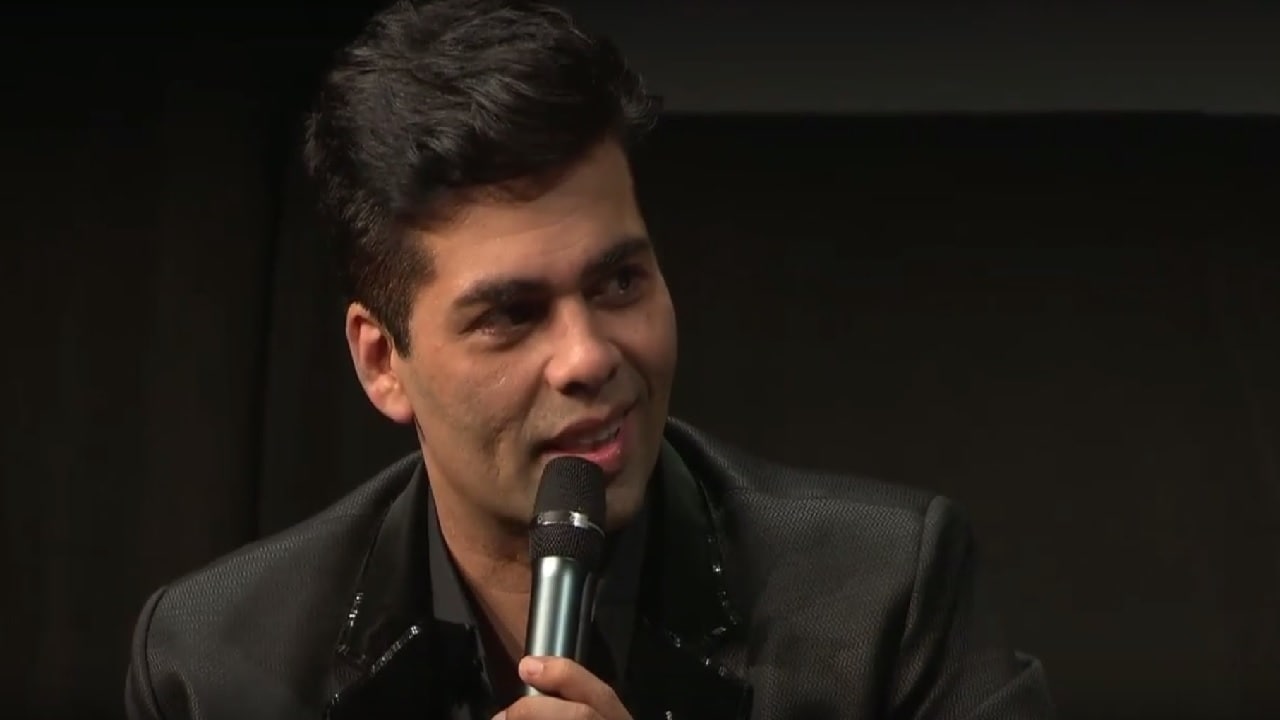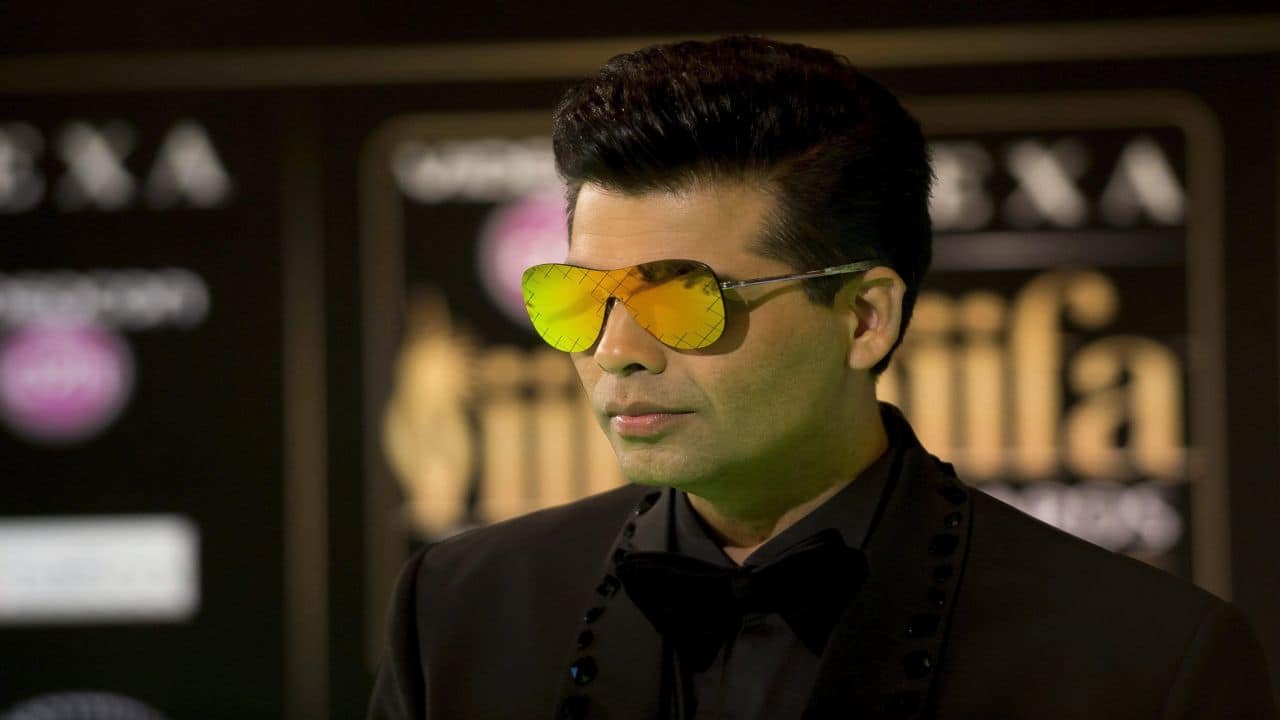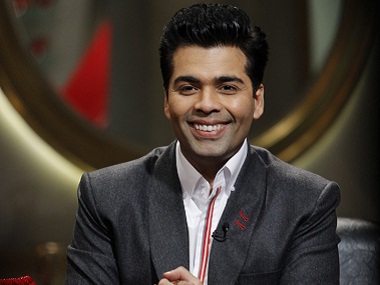It is surprisingly a quiet day at Dharma Productions. The plush, swanky space in Andheri seems like any other office, only if you missed the iridescent ‘DHARMA’ display that welcomes you with all the colours that Karan Johar’s cinema has stood for. There are no standees announcing the release of 2.0, the Rajinikanth-Akshay Kumar-starrer, which releases that day. There are only Karan’s pictures with his parents and stills from the best songs that have come out of Dharma’s jukebox. One of the visuals is that of Preity Zinta holding on to multiple colourful chunnis in the center of the frame, from the song ‘Maahi Ve.’ Interestingly, it is also the 15th anniversary week of Kal Ho Naa Ho. Karan looks back at his films through a lens that is as introspective as moist. His romance with the past does not come in the way of a compromise-free future. He loves cinema yet is invested in the digital space. He wants to go big but cannot help but support small films with a heart. He has no doubt that he is a businessman, but is also aware that creativity and commerce need to go hand in hand, like pyaar and dosti. Excerpts from an exclusive conversation below. Earlier this week, Kal Ho Naa Ho completed 15 years of release. It was a film as much about holding on to life tightly as it was about letting go. How difficult was it for you to hold on to a film as a producer, while letting go as a writer, since it was the first film you wrote but did not direct? I had worked with Nikkhil (Advani, director) on two films (he was an assistant director on Kuch Kuch Hota Hai and Kabhi Khushi Kabhie Gham…), so we had developed a sense of collaboration. That film will always remain close to me because I enjoyed writing it the most. It’s the most unusual story I’ve written, in terms of its formatting, narrative structure and characters. I must say it’s not easy to let go of your material. But because it was Nikkhil, I didn’t feel like that. [caption id=“attachment_5653351” align=“alignnone” width=“1280”]  Karan Johar. Twitter[/caption] After Nikkhil Advani, you have repeated almost every director who has helmed a film under Dharma Productions. Why do you feel the need to encourage new talent and also sustain them? That is just intrinsic in me. My nature was always to nurture talent and make sure it grows. I enjoy mentoring directors, actors and technicians. I feel like it’s my responsibility as not only a filmmaker but also a human, to not be content with what you have but also look outward. As filmmakers, we get very self-absorbed. We become borderline megalomaniac. I think it’s important to step out of yourself and energise your surroundings. How different was Kal Ho Naa Ho, that you wrote but did not direct, to now _Takht_ , that you have not written but will direct? Takht is written by Sumit Roy (screenplay) and Hussain Haidry (dialogues) . I have only given my feedback and they have applied those changes. It’s going to be an exhilarating ride. It’s the film where I did not contribute at all as a writer. I really enjoyed this because I’m going to approach it purely as a film. Because as a writer, you get very attached to your material. There’s always an internal tussle between the writer and the director. This time, I’m going to direct with a lot of abandon and freedom. I won’t hold on to it because I haven’t created it. You have said in your memoir _An Unsuitable Boy_ that you have directed films that people have loved, but never made a ‘great’ film. Do you believe Takht will be that ‘great’ film? You can not preempt, predict, and definitely can’t plan it. You can’t plan greatness. Greatness is a point of view. It is not a point of creation. You can never say for yourself that you’ve made a great film. People have to give you that feedback. I don’t think I’ve made any film that can be archived in the anvils of Hindi cinema. I still haven’t. I don’t know if I will, but I hope to. You’ve described Takht as the “K3G of the Mughal era.” What drew you to a period drama? I’ve always been obsessed by Mughal history. As a history student, it has been my favourite period that I love reading about, knowing about and seeing visual representations of. I’m just so excited that we finally have the technology, the scale, the wherewithal, the opulence and perhaps the ability to make such a film. Was that why it was important to outsource writers who are more well-versed with the details and texture of that era? Yes. Sumit is also a historian, along with being a screenwriter. Hussain knows that language and feel. The choice of writers was also suggested to me by my project development head Somen Mishra. He has been a major force behind constructing the writing team of Takht. [caption id=“attachment_5653371” align=“alignnone” width=“1280”]  Karan Johar. AP[/caption] Somen is also the Fiction Content head at your the new digital wing of Dharma - Dharmatic Entertainment, that you announced earlier this week. What is your vision for your presence in the web space? Yes, Somen is the Fiction head and Aneesha Baig (former NDTV journalist) is the Non-Fiction head. Digital is a liberating format that allows you to make content with abandon and not cater to the box office. I watch a lot of digital shows. I’m excessively becoming a part of that zone. We had our first big meeting earlier this week. There is a wide range of content coming up, of all kinds, and I hope we find homes for all of them. It’s very exiting because it is personally I’m very attached to. I just wanted to see the climate before I take the leap. It took two years to kind of gauge the surroundings and now I feel is the right time to go ahead. Do you then believe that the future of Hindi cinema will be limited to event films like Baahubali and _2.0_ , films that you have backed. Do smaller yet successful like Dear Zindagi and _Raazi_ not have any scope? If they do, what theatrical value do they offer? Two kind of films I’ve always stood by are big event and high concept. All the names you took are either big event or high concept. While there’re event films in the Dharma slate like Takht, Kalank , Kesari and _Brahmastra_ , there are also high concept films like _Good News_ , a horror film we’re producing by a new director named Bhanu, there’s also a new director Sharad who is making a biopic. So all the films have to be either big event or high concept. Everything in between will either go on a streaming platform or not work at the box office. While there has been a big event success in Baahubali 2: The Conclusion, we saw _Race 3_ and _Thugs of Hindostan_ bite the dust. Does these big films not meeting their mammoth expectations discourage you from backing more _2.0_s? The idea is to be constantly motivated and leave the rest to the destiny of the film. The only thing you can do is work hard. Sometimes, our thoughts do not become films. Sometimes, they do not resonate with the rest of the world. But that should not deter you from your path as a filmmaker. There’s always light at the end of the tunnel. We must seek that light. Your next production, _Simmba,_ is about a cop avenging crimes against women. Is Ranveer Singh’s character a symbol of how toxic masculinity be subverted to ensure better safety for women? I don’t want to reveal too much. That’s really something you should discover. But I can tell you that within all the mainstream prerequisites, there is very strong messaging. Otherwise, Simmba is a roller coaster ride with strong performances, strong action and strong direction. It is really a fine piece of work by Rohit Shetty directorially. You also have another event film in Kesari next year. You announced the film in collaboration with Akshay Kumar and Salman Khan two years ago. How has it shaped up now? Did Salman’s withdrawal affect the film in any way? Kesari is directed by Anurag Singh, who has made many credible films in Punjabi cinema, like Jatt Juliet and 1984. It’s based on the Battle of Saragarhi. It’s an inspiring tale of 21 Sikh soldiers fighting 10,000 invaders. It’s considered the best battle in the history of the world. Akshay Kumar helming the film and playing a mainstream protagonist has just taken the emotion of the film to a new high. It (Salman’s withdrawal) happened a while ago. No, it has not proved to be a hindrance of any kind. I’d love to collaborate with him in the future. Things did not work out then but it doesn’t mean in the future, they won’t. This is part 1 of the interview. Watch this space for part 2.
In an exclusive interview, Karan Johar talks about opening a digital wing at Dharma, 15 years of Kal Ho Naa Ho, is upcoming films Takht and Brahmastra, and the failure of Thugs of Hindostan.
Advertisement
End of Article
Written by Devansh Sharma
Twitter handle - @inkedinwhite see more


)
)
)
)
)
)
)
)
)



